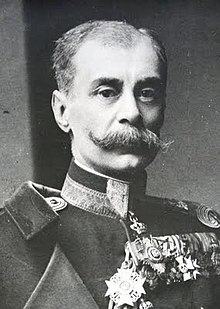Constantin Coanda
Constantin Coandă (born March 4, 1857 in Craiova , Principality of Wallachia ; † September 30, 1932 , Bucharest ) was a Romanian military, politician and brief prime minister .
Life
As early as the Russo-Ottoman War of 1877/78, in which Romania's independence was fought for, Coandă was involved in several battles as a young officer. He specialized in artillery , which is why he attended the Artillery School in Fontainebleau in 1880 . From 1887 to 1891 he was military attaché in Vienna , Paris and Brussels , and in 1899 Romania's representative at the Hague Agreement .
Promoted to brigadier general in 1902 , Coandă became city commander of Bucharest in 1911. In the Second Balkan War he was involved as a general in the victory over Bulgaria and the subsequent peace of Bucharest . After Romania's defeat in World War I , King Ferdinand I and his government withdrew to Iași , while Coandă took care of the coordination of the remaining Romanian army with the tsarist army within the Eastern Front .
When the defeat of the Central Powers in France became apparent, the pro-German Prime Minister Alexandru Marghiloman was forced to resign. From October 24 to November 29, 1918 Coandă served as Romanian Prime Minister and Foreign Minister . He declared the peace treaty with the Central Powers invalid, initiated a general mobilization and the re-entry of Romania into the war on the side of the Entente . The main goal of his government was the conquest of Transylvania to establish Greater Romania .
Coandă took part in a leading position at the Paris Peace Conference in 1919 , in particular he was involved in the Treaty of Neuilly-sur-Seine with Bulgaria. On December 8, 1920, he was seriously wounded in an anarchist-communist bomb attack. He was chairman of the Senate from 1920-1922 and 1926/27, and in 1926 Minister for Industry and Trade in the Alexandru Averescu government .
One of his seven children was the physicist and aerodynamicist Henri Marie Coandă .
Individual evidence
- ↑ Arthur Eyffinger: The 1899 Hague Peace Conference. "The parliament of man, the federation of the world". Kluwer, The Hague / Boston 1999, ISBN 9041111921 , p. 175.
- ↑ a b c biography on Enciclopedia Romaniei
- ^ Irina Livezeanu: Cultural Politics in Greater Romania. Regionalism, Nation Building, and Ethnic Struggle, 1918-1930. Cornell University Press, Ithaca 2000, ISBN 0801486882 , p. 22.
| personal data | |
|---|---|
| SURNAME | Coandă, Constantin |
| BRIEF DESCRIPTION | Romanian military, politician and prime minister |
| DATE OF BIRTH | March 4, 1857 |
| PLACE OF BIRTH | Craiova |
| DATE OF DEATH | September 30, 1932 |
| Place of death | Bucharest |
